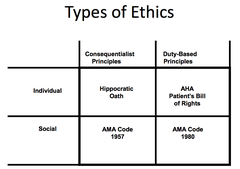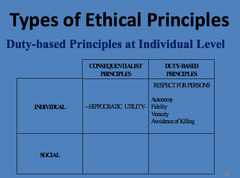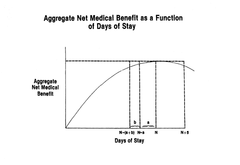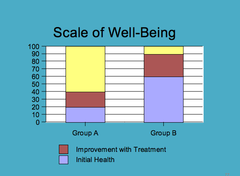Medical Ethics- Veatch – ALL – Flashcards
Unlock all answers in this set
Unlock answersquestion
Types of Medical Ethical Codes (2)
answer
1- *Hippocratic* - Those following the oath wording -those including the hippocratic principle 2-*Non-hippocratic* -those of the health professions -those from outside the health profesisons
question
Hippocratic Code: 3 Divisions of Medicine
answer
1- Dietetics 2- Pharmacology 3- Surgery
question
Hippocratic Oath- Initiation Section
answer
1- Swearing by the Gods 2- Pledge of loyalty to Teacher 3- Concern about secret knowledge - idea that knowledge is dangerous (note-difference with modern medicine)
question
Hippocratic Code 3 Prohibitions:
answer
1- Prohibition on Surgery ( dont defile yourself with touching blood) 2- Prohibition on giving Deadly drugs (expansion--> euthanasia) 3- Prohibition on abortion
question
Core principle of the hippocratic oath
answer
" i will apply dietetic regimen for the benefit of the sick according to my ability and judgment" *protect patients from harm*
question
6 Examples of Code of Ethics following Hippocratic wording
answer
1- Hippocratic Oath Insofar as Christian May Swear it 2- Florence Nightingale Pledge 3- Solemn Oath of a Physician of Russia 4- *Declaration of Geneva* --following nazis 5- SUNY Upstate at syracuse med 6- *SGU* Same wording: *benefit and protect patients from harm*
question
3 Examples Code of Ethics follow hippocratic moral principle *but abandon hippocratic wording* Core Idea
answer
1-Percival's Code 2- American Medical Association (1847) 3- British Medical Association Core idea= *job is to benefit the patient*
question
5 Examples of Non-Hippocratic Codes: from those in Health Profesions
answer
1- American Medical Association (1980, 2001_ 2- Chilean Medial Association 3- American Nurses Association code for nurses 4- Federal council of medicine- brazil 5- New Zealand medical association *After 1970s- shift to Non-Hippocratic Codes* - patient's rights! (exception nuremberg codes)
question
6 Examples of Non-Hippocratic Codes: from those in *Oustide Health Professions -Secular* Hint- Bill of Rights
answer
*1- Nuremberg Code (1946)* 2- Oath of sovie physicians 3- The American Hosptial Association Patients Bill of Rights 4- Council of Europe Convention of Human Rights and Biomedicine 5- US consumer bill of rights 6- Liberal Political Philosophy *After 1970s- shift to Non-Hippocratic Codes* - patient's rights! (exception nuremberg codes)
question
Nuremberg Code (1946)
answer
Using Human rights as subjects--> creates problem *Informed consent of subject is essential* Non-Hippocratic *After 1970s- shift to Non-Hippocratic Codes* - patient's rights! (exception nuremberg codes)
question
6 Examples of Non-Hippocratic Codes: from Religious Groups outside health professions Hint- Ethnic names- foreign (outside health )
answer
1- Caraka Samhita (hindu) 2- Oath Asaph (jewish) 3- Seventeen rules of enjuin (japan) 4-Ten Maxims for physicians and Ten Maxims (china) 5- Islamic code of medical ethics 6- Ethical and religious directives for catholics (USA)
question
UNESCO - Universal Declaration on Bioethics and Human Rights 2005
answer
International standard for code of ethics
question
Examples of Conseqeuntialists vs Duty-Based

answer
*Conseqeuntialists*: Benefit and Harms Duty-Based0 if you have a right, i have a duty
question
Characteristics of Non- Hippocratic Codes (3)
answer
1- Often from groups outside health professions 2- Concern with* social as well as patient welfare* 3-*Concern with duties and rights* as well as benefits and harms
question
Moral standing
answer
The term used to describe the moral status of beings - interests must be given moral consideration
question
Moral standing: Full vs Limited (w/examples)
answer
*Full Standing* - Living human beings -"1 person 1 vote" - as much claim as someone else *Limited Standing* - "Some claim/respect" - Human corpses -Egg and Sperm cells -non-human animals -perhaps fetuses
question
3 views on the definition of death
answer
1- Cardiac-oriented (circulatory) view 2- Whole brain oriented view 3- Higher brain oriented view
question
Cardiac-oriented (circulatory) view
answer
An individual dies when there is *irreversible cessation of circulatory and respiratory function* "Oriented"- not just the heart- if circulation is okay, still good "Clinical Death"- phrase often used- confusing
question
*Clinical Death phrase* in context of cardiac oriented view of death
answer
mistakenly used in hospitals when the patient may have his heart stop- but then can be rescusistated --confusing/meaningless
question
Whole brain oriented view
answer
an individual dies when there is *irreversible cessation of ALL functions of the Entire brain (including brain stem* ---*This is the current law* with Exceptions in Japan, NY, NY
question
What is the exception for the whole brain oriented view in Japan?
answer
Whole Brain oriented view of death is valid *only when these 3 things are satisfied* 1-Candidate registered for organ donor 2- Consent to the use of Brain Death criteria for death 3- Family concurs
question
What is the exception for the whole brain oriented view in NY/NJ
answer
Whole Brain oriented view of death is valid *unless there is registered WRITTEN religious objections to this definition*
question
Higher brain oriented view
answer
An individual dies when there is an *irreversible loss of "higher brain function" (consciousness)* Not currently the law
question
3 Views of when Abortion is still acceptable until Note- Similar to definitions of death
answer
1-Acceptable until *capacity for higher brain function* exists (Liberal = 24 weeks) 2-Acceptable until * any brain function* exists (Moderate = 8-10 weeks) 3-Acceptable until *capacity for cardiac function* exists --from latest to soonest
question
Abortion: Capacity vs Potential
answer
*Capacity*: -Actual ability to carry out function (ie- pump blood, nervous system, consciousness) *Potential*: (arises earlier than capacity) -Genetic program to develop the capacity to carry out the critical function (*conception---up to primitive streak*)
question
Non-human Animal Views (3)
answer
1- *Western (Traditional)*: -sharp division between humans and other animals 2- *Eastern* -Closer connections with animals (avoid doing harm) -ie hindu doctrines 3-*Recent Western* -Speciesism- membership in a species per se is relevant to moral standing -speciesists allow the interests of their own species to override the greater interests of members of other species
question
4 problems in *Assessing Patient's Benefit and harm*
answer
1- *Judgment: Objective vs Subjective* 2-*Medical vs Other Benefits* 3- *Conflicting Medical goals* 4-*Relating Benefits to Harm*
question
2 types of prinicples
answer
*Principle* - general characteristic of actions that make them morally right *virtue* character trait of a person
question
2 - Consequence -Maximizing Principles
answer
*Beneficence* -Doing good for the patient *Nonmaleficence* -Not doing harm *Hippocratic oath--> both of these* = Consequentialist principles
question
Utility
answer
Combined beneficence and nonmaleficence *Maximize* net good
question
Judgment: Objective vs Subjective (3 ) Ideas (1st issue problem with assessing patient's benefits vs harms)
answer
1- *hippocratic principle* - *clinician subjective judgment* of facts and therapy 2- *modern medicine* -use objective judgement of medical facts and science to tell which therapy is best (ie- journal of medicine) 3-*Postmodern or Contemporary* -Factual judgements should be objective -therapeutic choices are value judgments *Patient's values should take precedence*
question
Medical vs Other Benefits (2nd issue problem with assessing patient's benefits vs harms)
answer
Is the physician trying to *maximize the patient's health or maximize patient's total welfare?* - if goal = health, patient may want to trade health off for other goods -if goal= total welfare, physician may be inadequate
question
Conflicting Medical Goals- (know 4 ) (3rd issue problem with assessing patient's benefits vs harms)
answer
even if our goal is to maximize health..how do we prioritize 1- Save life 2- Cure disease 3- Relieve suffering 4- Promote health
question
Relating Benefits to Harm (know 2 formulas) (4th issue problem with assessing patient's benefits vs harms)
answer
How to we compare benefits to harms 1- *Hippocratic formula* - Arithmetic (subtract benefits- harms) - Geometric (ratio benefits/harms) 2- *Primum non noncere* (first off, do not harm) choose option that has least harm
question
Consequential vs Duty Based Ethics *4 Respect for persons Principles

answer
1- Fidelity (promise-keeping and confidentiality) 2- Autonomy (informed consent) 3- Veracity (truth-telling) 4- Avoidance of Killing (euthanasia)
question
Fidelity Hippocratic principle vs fidelity
answer
Duty of Loyalty - conflict with producing benefits *Confidentiality* *Hippocratic principle*- justifies breaking confidence to benefit the patient (paternalism) *Fidelity*- supports a duty to keep promises of confidence even if a patient would benefit from breaking it
question
Fidelity: Codes Permitting Paternalism Disclosure (breach) - 4 codes
answer
*Hippocratic principle*- justifies breaking confidence to *benefit the patient* (paternalism) 1- *Hippocratic Oath* 2- *British medical Association* pre-1971 3- *AMA Pre 1980* 4- *SGU* (for the good of our patient)
question
Fidelity: Codes NOT permitting paternalistic disclosures (no-breach) 3 codes Note Years
answer
1- *World Medical Assoc.- Declaration of Geneva* 1948 - Cannot break confidentiality - No matter what- exception-less -Keep confidentiality !! 2-*British Medical association* 1971 -Can *only break confidentiality IF:* -Patient agrees - Formal public policy 3- *American Medical Association- 1980* Can *only break if serious threat to harm others* (may include HIV)
question
Autonomy (informed Consent) history
answer
Absent in Hippocratic ethics Absent from all ancient traditions Grounded in liberal political philosophy and *Kant* Some compatibility with *early christianity*
question
Autonomy = Rights 2 types
answer
Rights= Justified moral or legal claims to entitlements or liberties Given precedence over consequences 1-*Negative Rights* - "Liberty Rights" -Right to be left alone 2-"Positive Rights* - "Entitlement Rights" -Right to have good or service
question
Autonomy - Hippocratic Discussion? Therapeutic privilege
answer
Hippocratic ethic *weak justification for consent* -therapeutic privilege= clinicain's privilege of withholding information that he believes will be harmful Note- principle of autonomy provides stronger requirement of informing the patient
question
Natanson vs Kiline 1960 - issues on therapeutic privelege
answer
Established *physician must ensure disclosure is sufficient to assure an informed consent*
question
3 Standards for informing (duty to inform- recall pope)
answer
1- *Professional Standard* (reasonable physician) -what competent physicians similarly situated would disclose 2-*Reasonable person standard* -what a reasonable patient would want to know 3- The subjective standard -what *specific patient* would want to know ex- pianist getting hand surgery
question
What is the emerging consensus regarding informing?
answer
Autonomy requires the use of the *reasonable person standard* modified by the *patient's subjective interests* = reasonable person standard + subjective standard
question
Veracity (one of the 4 respect for persons- principles)
answer
Truth telling and lying Disclosure
question
*Meyer* on Veracity Basis?
answer
*Opposes Disclosure* - physician has the right to withhold, if it does more harm (ie cancer--> depression) Basis: Hippocratic Oath
question
*Fletcher* on Veracity Basis?
answer
Normal practice should disclose for benefit of patient Basis: Hippocratic Oath
question
Novack, Dennis - 1979 study on Veracity
answer
88% tend to *withhold cancer diagnosis*
question
Donald Oken 1961- Study on veracity
answer
98% tend to *disclose cancer diagnosis*
question
W.D Ross on Veracity
answer
*Favors Disclosure* -Need to balance: Hippocratic Utility and Veracity
question
American Medical Association 1980- on Veracity based on 2 philosophers
answer
"Physician shall deal honestly with patients and colleagues" *shift from hippocratic oath to duty based* -Ideology: KANT and Fletcher
question
4- Key issues of Death and Dying (Competent Patients)
answer
1- Active Killing vs Letting Go (passive) 2- Stopping vs Not starting 3- Direct vs Indirect 4- Ordinary vs Extraordinary Ethical way of death involve =Letting go + indirect form
question
Active Killing 2 types
answer
General Rule: Unethical 1- Homicide -ordinary homicide - Homicide on request 2- Assisted Suicide
question
Assisted Suicide vs Homicide on request
answer
*Assisted Suicide* -helping a patient take his own life ex- " prescribing a drug and writing instructions for a patient to take his own life" *Homicide on request* -Doctor takes the last step and ends the patient's life on request ex- Doctor injects lethal dose into the patient
question
Letting Go (Passive) -2 ways
answer
General Rule: Usually Ethical and permissible =Forgoing Life Support 1- Withholding 2- Withdrawing
question
Stopping Vs Not starting
answer
Clinicians feel Stopping (Withdrawing) and Not Starting (withholding) are different... However - everyone else says *the 2 terms mean the same thing* Lawyers theologists Philosophers
question
Ordinary (in terms of death and dying)
answer
=proportionally beneficial (ie benefits greater than burdens) - required to do
question
Extraordinary (in terms of death and dying)
answer
= benefits do not exceed burdens Not required to do
question
2 Arguments against distinction of "active killing and Letting die" (ie active killing = same thing as letting die)
answer
Jack Kovorkian = Consequentialist theory of Utility =Benefit the patient to assist in their suicide 1- The consequences of Active killing *is no worse * than letting someone die, in some instances it might be better. (ie Jack kovorkian) 2- *Autonomy* should give competent people the right to kill themselves (ie gives right to consent or withhold ...thus it should give right to kill yourself if competent)
question
3 Arguments for distinction between "active killing and Letting die" (ie active killing is NOT same thing as letting die)
answer
1- Consequences of active killing may be worse (ie may weaken societies opposition to killing) 2- Patient *autonomy requires clinician not to treat* but does NOT require physician to actively kill 3- Active killing is simply inherently wrong (ie *KANT*) - always unacceptable
question
SGU Oath- on killing and death
answer
pledge not to maliciously cause death of anyone
question
Indirect Killing (2)
answer
*Unintended to harm* (ie side effect) - Acceptable It can be: *Active*- (anesthesia side effect- without intention) *Passive*- ( forgoing life-support) *Note- sometimes foreseen deaths may be unintended ie - hysterectomy to save pregnant woman - did not intend to kill baby
question
Direct Killing (2)
answer
*Intended to cause harm* - NEVER acceptable It can be: *Active*- (giving lethal injection, assisted suicide) *Passive*- ( patient who you want to die, you walk out the door when he needs resuscitation )
question
Death in regards : 3 types*incompetent patients* which are...
answer
1- Formerly Competent Patients 2- Never Competent Patients without Family 3- Never Competent Patients with Family
question
Formerly Competent Patients Principles: Moral Legal
answer
Expressed wishes about terminal care while competent via 1- *Substantive directives*- Yes/no on future decisions 2- *Proxy Directives*- entrusts a surrogate *Moral = Autonomy Extended* - patient was once autonomous and had wishes--extend them to when not competent *Legal= Substituted Judgment*- Proxy makes a decision *based on patient's* values, beliefs etc (in their shoes)
question
Never Competent Patients without Family (3) Principles: Moral Legal
answer
No one with standing to speak for patient--need to find surrogate (3) 1- Rely on hospital ethics committee 2- Legalize attending physician surrogacy 3- *get a guardian appointed legally* (best) Moral =* Hippocratic Uitlity* - whats best for patient Legal = *Best Interest*
question
Never Competent Patients with Family Principles: Moral Legal
answer
Family given standing to speak for patient ---*usually Next of kin* Exceptions: proven malicious, unreasonable, unwilling Moral =* Limited Familial Autonomy* Legal = * Limited Familial Autonomy* "family has decision to make single best choice but will give them a range of options that are reasonable"
question
Given : Chart of Aggegate Medical Benefit as a function of days spent in hospital (4- view on number)

answer
1-* Hippocratic Utility(Subjective)*- For the benefit of the patient according to the *physician's ability* (N+Gamma) - tends to stay longer than the max benefit period; tend to get Iaterogenic illness 2- *Peer Review Objective*(hippocratic- objective)- EBM - more benefit less costs (N) 3- *Post Modern* -EBM plus Patient's Perspective - *Autonomy* (subjective judgement) = (N-A) - patient's prefences 4-* Societal View*- only marginal benefit to patient- need to pay for everything else - (N-A-B)
question
Hippocratic utility
answer
Consequentialist - Individual *Benefit patient according to the doctor's ability*
question
Declaration of Geneva
answer
For the Health of the Patient
question
Principle of Social Utility 2- problems
answer
Action in which it produces the most amount of good in total for the most amount of people Problems: 1-*Quantification Problem* - how do you make an objective measurement for quantifying comparisons? *Rank order based on amount of good produced per dollar invested (medicare?) 2- *Inequality Problem* -hard to allocate resources fairly
question
Quality of Life Adjusted Measure
answer
QLAY Unit = 1 Year benefit at Perfect Health Thus a patient who is sick at level 0.50 for 2 years will have 1 QLAY units
question
Possible " End State Patterns" (5) Aristotle + Modern
answer
*Aristotle Pattern* 1- Slave vs Free 2- Rich vs Poor 3- Aristocrat vs commoner *Modern* 4- Effort (more effort--> more reward) 5- Need (more need--> more money)
question
Principle of Justice Problem
answer
Action that strives for an "end-state pattern" of the distribution of the good- *Fairness and Equity- how goods "ought to be distributed"* -Helps those who are worse off (ie allowing more women for kidney transplant than already high number of male candidates) Problems -*Less Efficient* -may not do as much goo as the principle of social utility
question
Med Students Social principle preference
answer
Social Utility
question
2 Groups: Which decision show Justice and which is for social utility

answer
*Group A* = Justice - Helps the sickest patients improve -*Less efficient* -only 20 units x number of pts =benefit -Targets those who are worse off *Group B* = Social Utility - "do as much good for as many people" -30 units x number of pts = benefit -More efficient -But helps those who are already better off
question
Reconciling the conflict among competing Principles (4) methods - how to choose which ethics
answer
1-Single Principle theories 2- Balancing theories (prima facie duties and duty proper) 3- Ranking (lexically ordering) 4- Combining balancing and ranking
question
Single Principle theories : how to choose which ethics
answer
Pick only 1 principle - Reduce all the other ones
question
Balancing theories: how to choose which ethics
answer
Duties to consider =*Prima Facie Duties* - look at all of them first The winning principle =*Duty Proper* Ie - Ross descides between Veracity and Hippocratic Utility (Prima Dutie Facie) --Chooses Veracity (Duty proper)
question
Ranking / Lexical ordering : how to choose which ethics
answer
Order principles- and prioritize (ie Autonomy > Justice> Social Utility) Rank, Then order based on precedence
question
Combining balancing and ranking : how to choose which ethics
answer
1- Rank Principles 2- Then Balance competing claims that have the same rank IE- Rank 1- Duty Based Principles (autonomy, fidelity, veracity, avoidance of killing and Justice) 2- Consequentialist Principles Balance-Autonomy> Fidelity
question
2 Options : the clinicians role in allocating resources (social ethical problem)
answer
1- Let clinicians abandon their patients at the margin (be the one to cut costs) *Problems* : -Difficulty calculating - Abandons *hippocratic oath*- no longer a patient-centered physician 2- Give clinicians exemption from the principle of social ethics (only individual basis/patient) - *allows doctors to remain loyal to paiteints* *Problems* : -another party has to do the rationing for resources
question
Law and Seminaries Social principle preference
answer
Justice



